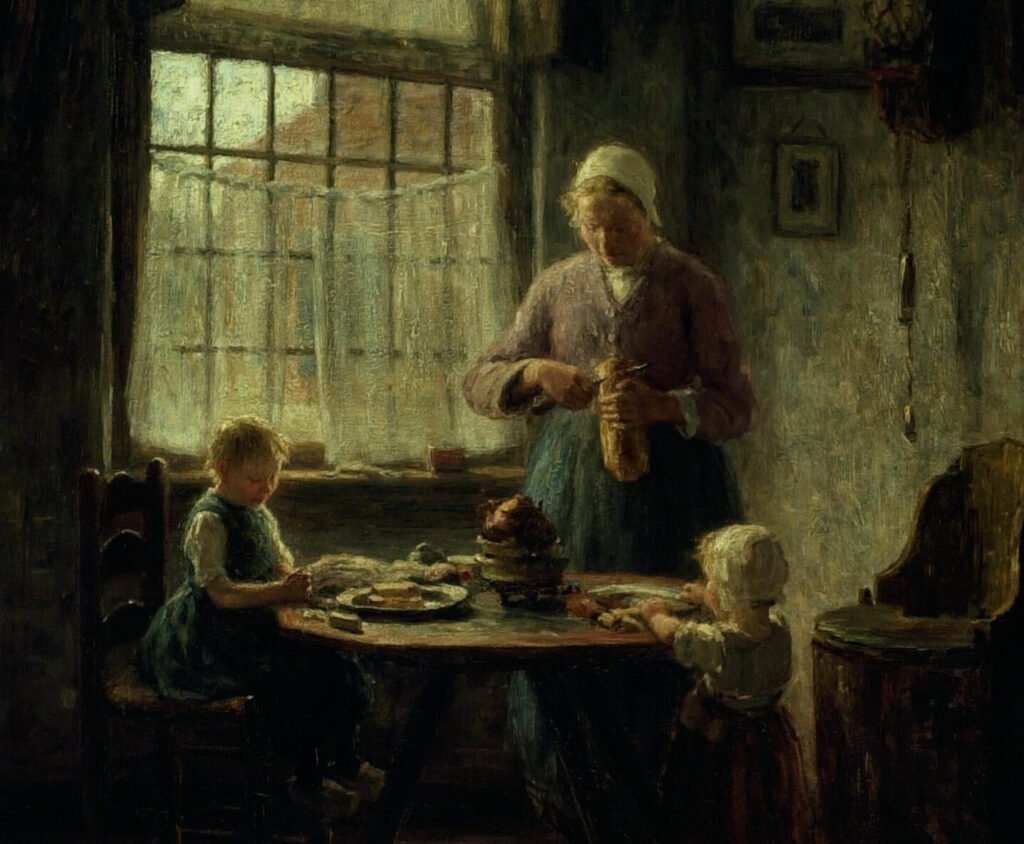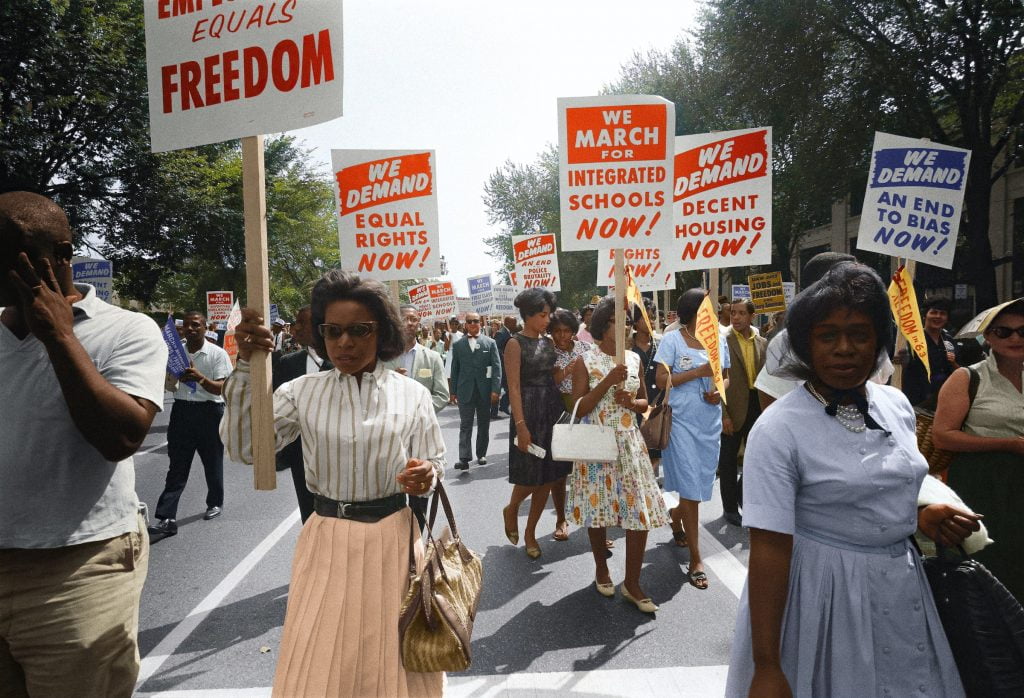The White Christian will, at one point or another, be called racist, so it is important to properly understand the topic so as to not be caught off guard, confused, or manipulated. A simple gander online will reveal the obvious: there are many conflicting definitions people use to define “Race” and “Racist,” making it nearly impossible to have any sort of reasonable discussion. Noticeably absent from the discussion is a coherent Biblical definition that manages to properly maintain taxonomies. Hopefully, I will be able to offer some assistance in finding a useful interpretation that is faithful to what we believe as Christians.
So God created man in his own image, in the image of God created he him; male and female created he them.
Genesis 1:27 (KJV)
The Consequence of Being Inconsistent
You have heard it before: “We are all one race, the human race.” At a technical level, this statement appears to be true; after all, we are all human! The problem is that the “human” and “race” are not synonymous. In fact, the mere suggestion that race can also be applied to non-human mammals is a denial of this common proposition. Words must have precise definitions. Conflating two words that mean different things is both confusing and unhelpful. For the time being, Christians agree on what a “human” is, but the other is tripping up our spiritual brothers and sisters, and as mentioned earlier, there are many ways a person can use the word “race.” In my personal experience, many Christians are inconsistent with how they use it. Whenever they hear the word, they bring out the ol’ reliable one-race argument, but whenever they say the word, it is to mock the idea that someone could think that humans are functionally different creatures wearing divergent skin colors. In practice, both reactions act as two extreme opposites. Which is it? Does race mean skin color, or does it mean a completely different creature altogether?
The reason why this matters is because if we don’t know what race is, then we leave the direction of the argument to our enemies. He who controls the direction controls the argument, and as things stand, the discussion is lost before it begins. There needs to be a clear definition if we have any hope of reclaiming the narrative. Before progress can be made towards that end, I must first dispel the tightly held convictions of the two extremes.
It always astounds me when Christians assume the Darwinian definition when engaging with other Christians. Not only, in this instance, is no one arguing that we are not one humanity (as the offended party claims), but if you accept the belief that humans evolved from a state of non-human, you are not a Christian to begin with. The entire situation is ludicrous on its face. All are descended from Adam and again from Noah. In this way, all of humanity is related to one another and shares the same nature and the same humanity. We are, of course, human, but we are also Asian, African, Middle Eastern, or European. The three sons of Noah are generally considered to be the fathers of what we now consider to be “races”; in my case, Japheth spawned what would become the Europeans. Just as a husband and wife pass on their dominant traits to their offspring – extrapolating that to a national level – generations of descendants solidify these traits. The “Races,” when understood in this way, are simply a distant extension of family. After one’s immediate family, there is an extended family with aunts and uncles and cousins, and then certain tribes, then nationality, then race, and then humanity as a whole. Properly ordering your affections to love your parents and siblings before the stranger is the only acceptable position for a Christian, so bringing that out to each of these realms of familial blood ties, having a love for your race above the others, is perfectly natural and biblical. Of course, loving all of humanity and the various categories in which they fall is a command from God, but there is an order in which these loves can be understood.
The implication of the complexion definition is obvious. The very concept of racism became a libelous weapon to be used on any Christian who had properly ordered his affections. Following the death of Freddy Gray, the Left weaponized this belief to attack the very White Evangelicals that held it. Racist = White and White = Racist. Indeed, these accusations were parroted, even by conservative Church giants. These definitions of “Race” are absurd, but it is important to understand them because you will encounter them. I propose that this acquiescence to the Leftist framework has contributed, in large part, to the liberalization of what was once “conservative” Christianity. The moment we reject this simplistic and false understanding of race is the moment that the Left loses its hold over the Right in the race debate.
Back to the Drawing Board
Having rejected these definitions, it is clear that the concept of “race” must be specific enough to mean something but must also function as a categorical term. Are we all equally human? Yes. Are there physical and biological distinctions? Also yes. As mentioned before, characteristics are passed down generationally. Height, health, physical build. These are all traits that children inherit from their parents. Geographical location and the necessities they provide also contribute to these physiological differences. Just as birds of the same type can have different beaks to suit their needs, bone structure and density among humans vary from continent to continent. This can also be said about resilience to various diseases. Broadly speaking, each continent offers birds of a feather (so to speak), which makes it easy to notice the physical distinctions between the “races,” but what about the non-physical? We all have family traditions that are a vital part of our upbringing which subsequently influence the kind of people we become. After generations, we take these for granted, but there was a genesis to them. Cultures and traditions develop from uniquely particular actions and attitudes. What causes these differences from all around the world? If we all had the same inclinations, the same desires, and aptitudes, then the cultures would be, to various degrees, similar. They are not.
I suppose it is possible that the cultural distinctions overlapping almost perfectly with racial distinctions are a coincidence, though the mere presence of two definitions makes such a phenomenon entirely unbelievable. These cultural affinities can be altered, and there is no doubt about that. As I wrote in the previous post concerning race, cultures rise and fall. They can be born, they can adapt, and they can die independent from “race.” This is evident throughout history but does not refute the fact that culture has racial origins. Europe is comprised of numerous cultures and peoples, but they all share certain commonalities that are not shared with other continents. If a Spaniard were to visit Poland, he would be out of his element, but it would not be a culture shock in the same way as a Turk visiting Poland. This understanding of race is not novel. The Webster’s Dictionary defines the word in much the same way.
any one of the groups that humans are often divided into based on physical traits regarded as common among people of shared ancestry
“Race.” Merriam-Webster Dictionary1Merriam-Webster, https://www.merriam-webster.com/dictionary/race. Accessed 16 Feb. 2024.
Race is lineage. How far back you go will define your race in a given context. The race of Adam? The European race? The Scottish race?
Nationality
People within these groups, too, have distinctions. To use Europe as an example, there are the Nordic, Celtic, and Anglo races, each with their own peculiarities. The Roman campaign in Germany is a perfect case study. The Germanic tribes were of a stock that made them physically ferocious and beasts among men. The Romans, on the other hand, were a tiny people. Their ferocity was found in their tactics and ability to build. On the one side, you had strong, imposing men living in huts. On the other, a short people who managed to conquer half the world and build a great civilization. This, then, includes the obvious physical and biological differences, but I would argue it can include tendencies, aptitudes, and inclinations, as well.
The question of nature versus nurture is an interesting one because it is my belief that both are relevant. There is no question that being born into a particular culture shapes the person. Two racially German babies, for example, one born and raised in Germany and another in Saudi Arabia will grow up with very different understandings and responses to the world, and as a result, they will be drastically different, culturally. Does this erase the second boy’s ancestry? No, he is still racially German. The only difference is that he was raised in a nation of non-Germans. But where do these cultures come from? Why is it that Saudis have a particular culture and Germans have a particular culture?
My father’s love for baseball and sophisticated films instilled in me that same love. My mother’s love of the arts and history instilled in me that same love. Why would that not be the case for the family on a racial level? With all that said, ideas, books, and culture propagated through the modern globalization of the world are arguments against this hypothesis.
Final Thoughts
The application of this thought process is difficult. How much do these differences really matter? On one extreme, love of race can elevate to the point of arrogance and undue superiority or even a belief that we are more different than we are as human beings – as differently human. On the other, if it is seen as just something we “happen to be,” then it is belittling a gift of God. We are each of us the product of thousands of years of history and ancestry. As Christians, we take great joy in the knowledge that He knows every hair on our heads. Why, then, do some of us snub the world and every action, every thought, and the millions of people – the significant and insignificant hands that were guided by God’s providence – who walked before us today? We are who we are because of who we are. God designed us specifically and intentionally according to His plan. To be indifferent to one’s race is to tell God, “Who cares?”
I will leave you with this final thought. Scripture speaks of Heaven being filled with people of all tongues, tribes, and nations. This implies not only that there are different tongues, tribes, and nations but also that these distinctions will remain into eternity. This further suggests that the differences that exist between us are not products of the fall but natural and inherently good and were God’s plan from the very beginning.
Sources:
- 1Merriam-Webster, https://www.merriam-webster.com/dictionary/race. Accessed 16 Feb. 2024.





Leave a Reply